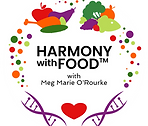My Stance On GMOs
- Meg ORourke, RD-LDN
- Jan 30, 2018
- 3 min read
Updated: Sep 25, 2020
The annual "What's Trending in Nutrition" survey from Today's Dietitianpredicts 2015 will be a year GMO-free matters: Fellow dietitians forecast that you’ll make your grocery shopping choices based on non-GMO ingredients. But should you? You already read nutrition labels carefully, and seek out products labeled low-sodium. Should you also be looking for foods branded GMO-free?

Not necessarily. GMOs, or genetically modified organisms, have had their genetic makeup manipulated to create specific results. In the case of crops like corn and soy, their seeds have been altered to be drought tolerant or resistant to pesticides. Opponents worry what such alteration does to our health, fearing GMOs expose us to large amounts of toxic pesticides. Proponents claim GMOs reduce the amount of pesticides farmers need to use, and that they’re a necessity to meet our current and future food demands. In other words, their safety is highly debatable.
Although other countries have restrictions on the production and sale of GMO foods, our government has deemed them safe. I don’t believe there’s enough scientific proof that they’re causing long-term ill effects on our health. So, I’m not going out of my way to avoid them, and don't advise you bend over backwards to do so. Here’s the middle-of-the-road approach I do recommend:
Eat more whole foods and fewer processed foods. A healthy diet is a diet rich in fresh fruits and vegetables, whole grains, and high-quality proteins like lean meats and seafood—not cookies, frozen pizza, and hot dogs. And there’s no debating that! It just so happens that when you eat more whole foods, you’re not only eating healthier, you’re also avoiding most GM ingredients (especially if you buy organic; see my next bullet): According to the Non-GMO project, GMOs can be found in about 80 percent of conventional processed food.
Consider organic. Studies have shown that organic produce is generally more nutritious than its conventional counterparts, as it contains more antioxidants and important minerals. As a nutritionist, that excites me, so I do buy some organic fruits and veggies. The law prohibits the use of GMOs in organics, which means an organic corn farmer can’t plant GMO seeds and an organic soup producer can’t use any GMO ingredients in their product. I recognize that cost can be a factor, so consider purchasing organic foods (remember, mostly whole foods) when they’re reasonably priced and when you’re able—for higher nutrient content and to easily avoid GMOs.
Stay informed. While I don’t believe there’s sufficient evidence that GMOs are bad for our health, I recognize that lack of proof doesn’t unequivocally mean lack of harm: Years ago, no one believed trans fats were unhealthy, while that fact is universally accepted today. Read current articles about GMOs and the dispute about GMO labeling to stay savvy. (I do believe they should be labeled and that everyone has the right to make educated food choices.) This 2014 article from Today’s Dietitian shares experts discussing pros and cons. Websites on both sides of the argument include factsaboutgmos.org, gmoanswers.com, nongmoshoppingguide.com, and nongmoproject.org.
I’m not losing sleep over GMOs, and neither should you. But here’s my promise: I will also stay informed and up-to-date on this issue. If my opinion changes and I believe there’s any reason for you to take a more extreme approach to avoiding GMOs, I will be sure to let you know.
Coming up: How this nutritionist feels about trendy meal services like Blue Apron...
Images courtesy of Stoonn, Mister GC, Toa55, and digitalart / FreeDigitalPhotos.net. Photo of me taken at the ribbon cutting ceremony for Hope & Main, Rhode Island's first kitchen incubator, of which I'm a BIG supporter. Learn more at makefoodyourbusiness.org.





.png)























Comments